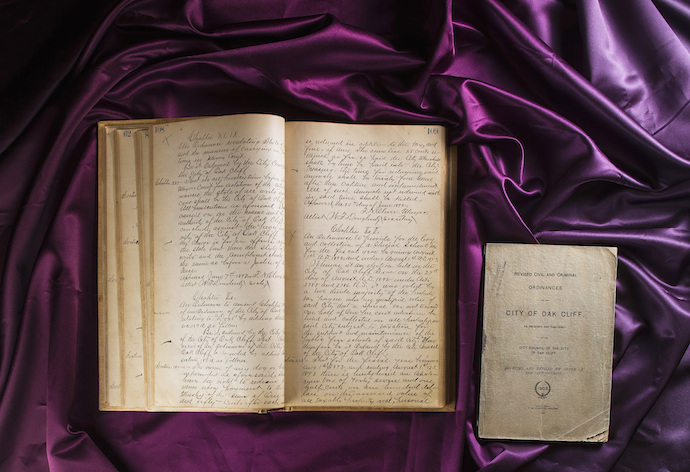
Photo by: Danny Fulgencio
Code compliance
The city of Oak Cliff incorporated in 1890 and was its own municipality for 13 years.
The original handwritten Oak Cliff city ordinances in the Dallas Municipal Archives show a slice of life in Victorian-era Oak Cliff.
The sale of alcohol was legal as long as a business was licensed with Dallas County. And drugs were legal, with a prescription:
“That it shall be unlawful for any person to have filled a prescription for cocaine, morphine or opium, except for actual use where needed as medicine.”
Vagrancy was punishable by up a fine of up to $10 if convicted. The ordinance offers eight definitions of vagrancy:
1. Any idle person who lives without any means of support and makes no exertions to obtain a livelihood by honest employment.
2. Any person who strolls idly about the streets of Oak Cliff having no local habitation and no honest business or employment.
3. Any person who strolls about to tell fortunes or to exhibit tricks not license by law.
4. A common prostitute.
5. A professional gambler.
6. Any person who goes about to beg alms who is not afflicted or disabled by a physical malady or misfortune.
7. An habitual drunkard who abandons, neglects, or refuses to aid in the support of his family.
8. All suspicious persons.
A “tramp,” defined as any vagrant illegally entering an Oak Cliff home or building, could be fined up to $100.
Livestock and pets were a big part of life back then.
Residents and businesses could keep a maximum of 30 head of cattle, hogs or other stock at a time. And those animals were explicitly protected by ordinance. It was illegal to leave any animal tied up or to “cruelly maltreat any dumb animal in the City of Oak Cliff.”
“… to willfully or wantonly kill, maim, wound, poison or disfigure any horse, ass, mule, cattle, swine, dog, or other domesticated animal, or bird, or beast of any kind or to mutilate or cruelly kill, or over-drive, over-ride, or over-load, or unnecessarily confine or in any manner oppress the same, or to unnecessarily fail to provide the same with proper food, drink or shelter …”
Dog fighting was illegal, and there were rules about roaming dogs. It cost $1 to register a male dog and $2.50 to register a female. It was legal for the city marshal to shoot and kill any female dog in heat that was found to be roaming the town.
There are quite a few laws about vice.
Gambling, for example, was illegal. Ordinances specify there’s to be no gambling on pigeonhole or Jenny Lind tables, which were types of billiards tables. Betting on bowling also was expressly forbidden. Other unsavory gambling games: Poker, dice, jackpot, high dice, low dice, crack-o-loo, dominoes or muggings. The fine for gambling was a steep $25-$100.
Prostitution takes up several articles: “If any male person within this city walk or ride in the streets with any commonly reputed prostitute or lewd woman, he shall be fined in any sum not exceeding one hundred dollars.”
Prostitutes themselves, or “bawdy or lewd women, or any female inmate of a bawdy house or house of prostitution,” could be fined between $5-$25 if they were found “wandering about the streets … in the nighttime.”
Before indoor toilets and a sewer system, keeping one’s “privy” tidy was part of an Oak Cliffer’s civic duty.
One’s privy or “necessary house” could not be located within 3 feet of an adjoining lot or the street. Any outhouse found to be offending, because of odor or filth, could incur daily fines until it was removed.
Oak Cliff employed a “city scavenger” to inspect and clean all of the outhouses and haul off the waste. For this, the scavenger was paid 15 cents per cubic foot. He could also be hired to haul off the carcasses of horses or cows ($2), hogs ($1), dogs (50 cents) and chickens or cats (10 cents).
This being not so far removed from the Wild West, there were laws about firearms. It was illegal to shoot a firearm across a public street or square. And there were limits to how much gunpowder could be carried.
Gunpowder had to be kept in “secured kegs, boxes or canisters sufficiently close to prevent the grains there of from falling out,” and they had to be covered in a sheet of canvas or other cloth.
The maximum that could be carried through Oak Cliff was one 25-pound keg of gunpowder.
In the old days of Oak Cliff, churches were the center of life, and Sundays were sacred. No commerce of any kind was allowed on Sundays, including stores and street vendors. Theaters and “any amusements” were not allowed to open. And you had to keep it quiet on the Sabbath.
“That if any person or persons shall on Sunday, engage in any game of baseball, football or any similar noisy game in any public or private place, lot or lots within this city, except in the baseball park, he, she or they shall each be fined not less than two nor more than ten dollars for each offense.”
After a losing legal fight from Oak Cliffers (that’s a whole other story), the City of Dallas annexed Oak Cliff in 1903.





